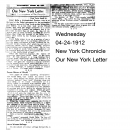Main menu
- ‘Abdu’l-Bahá’s Journey
- World Peace
- Stopping Racism in America
- Empowerment of Women
- More Principles...
- Prayer for America
Our New York Letter
Special Correspondence of The Chronicle.
‘Abdu’l-Bahá, a distinguished Persian, who is at the head of the Bahá’í movement for the unification of religions, arrived in New York on the White Star liner Cedric. It is his first visit to the United States, and, with the single exception of a short visit to Paris and London last summer, this is the first time in more than 40 years he has left the “prison city” of Acre, in Syria, to which he and his father, Bahá’u’lláh, the founder of the Bahá’í movement, were exiled by the Turkish government 50 years ago.
‘Abdu’l-Bahá comes to us on a mission of peace and will deliver one of his principal addresses before the peace conference at Lake Mohonk the latter part of this month, after which he will deliver addresses before various peace societies, religious organizations and educational bodies. As he puts it, he is ready to speak “wherever an audience can be found to welcome peace and promote the realization of the brotherhood of man.”
When the reporters boarded the Cedric off quarantine they found ‘Abdu’l-Bahá on the upper deck. He was dressed in a long, flowing black oriental gown, underneath which was another of a light tan color. On his head he wore a snow-white turban. He gave the reporters a hearty welcome, and he proved such a good talker that there was no occasion to ask questions. He talked of newspapers, of women suffrage, of universal peace, of religion and of Persia. He began with newspapers.
Papers Mirror of World.
“The pages of swiftly appearing newspapers,” said ‘Abdu’l-Bahá, “are indeed the mirror of the world. They display the doings and actions of the different nations; they both illustrate them and cause them to be heard. Newspapers are as a mirror which is endowed with hearing, sight and speech; they arc wonderful phenomena. But it behooveth editors to be sanctified from the prejudice of egotism and desire, and to be adorned with the ornaments of unity and justice. There are good newspapers and likewise bad ones. Those that strive to tell only the truth are like the sun, for they light the world everywhere and their work is imperishable. Those that play for their own little selfish ends give no true light to the world and perish of their own futility.”
When the Cedric was opposite the Statue of Liberty ‘Abdu’l-Bahá extended his arms in a salute and referred to his own long exile in Syria. Then he talked of world-wide peace, which he termed the greatest of all causes. The diversity of faiths and the lack of universal auxiliary languages he mentioned as the obstacles that are to be surmounted in the attainment of the peace program.
Here a reporter interrupted to ask what “Bahá’í” means.
“It means,” answered ‘Abdu’l-Bahá’í, “to love all the world, to love humanity, to serve it, to work for universal peace and universal brotherhood.”
As to Woman Suffrage.
On the subject of woman suffrage he had this to say:
“The modern suffragette is fighting for what must be, and many of these are willing martyrs to imprisonment for their cause. One might not approve of the ways of some of the more militant suffragettes, but in the end it will adjust itself. If women were given the same advantages as men, their capacity being the same, the result would be the same. In fact, women have a superior disposition to men; they are more receptive, more sensitive, and their intuition is more intense. The only reason of their present backwardness in some directions is because they have not had the same educational advantages is men.
“If a mother is well educated her children will also be well taught. If the mother is religious the children will also be religious; if the mother is a good woman, then the children will also be good.
“The future generation depends, then, on the mothers of today. Is not this a vital position of responsibility. Sorely God does not wish as important an instrument as woman to be less perfect than she is able to become. Divine justice demands that men and women should have equal rights. There is no difference between them, neither sex is superior to the other in the sight of God.”
The skyline of New York greatly interested ‘Abdu’l-Bahá. He called the big skyscrapers “the minarets of the Western world’s commerce and industry.”
On the pier a thousand people, most of them followers of ‘Abdu’l-Bahá, were there to greet him, and the welcome pleased him immensely.









